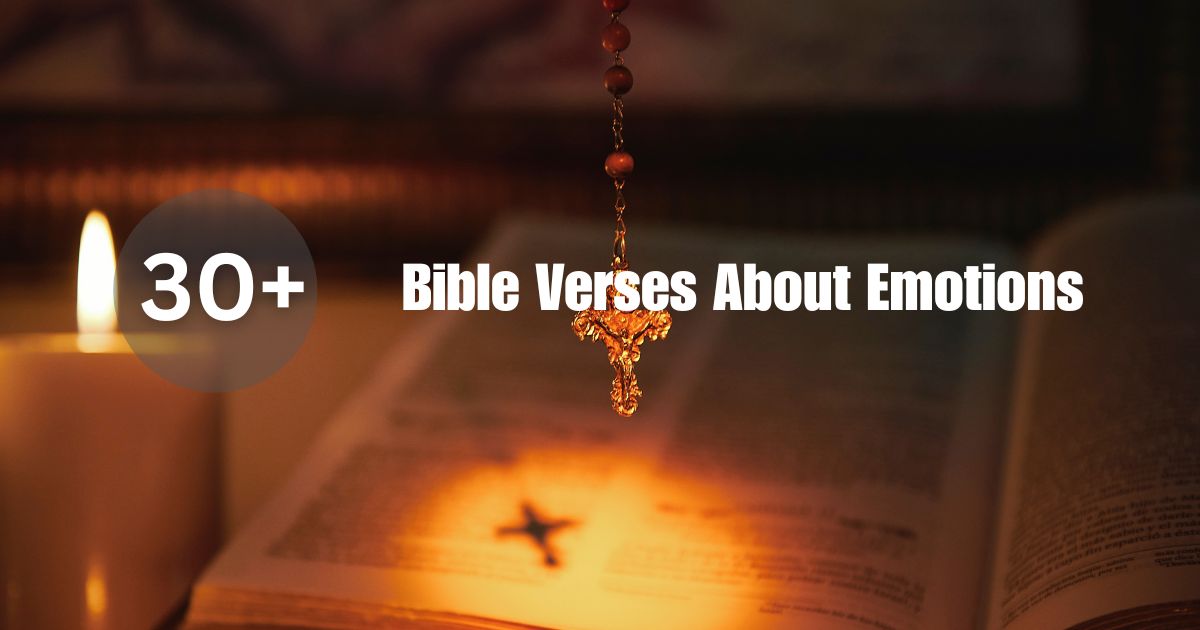I know how heavy emotions can feel when life and family relationships seem overwhelming. There are moments when anger, fear, or sadness rise so strongly that it is hard to find peace. In my experience, turning to Bible Verses About Emotions has brought clarity and comfort in times when nothing else seemed to help.
These passages speak directly to the heart, offering guidance that goes beyond theory and into real healing. If you are searching for strength to face emotional struggles, scripture provides both truth and reassurance that you are not alone.
What Does The Bible Say About Emotions?
The Bible acknowledges that emotions are a natural part of being human. From joy and peace to fear and sorrow, Scripture shows us how to bring every feeling before God. Emotions are not meant to control us but to guide us closer to Him when we align them with His Word.
For example, “Cast all your anxiety on him because he cares for you” (1 Peter 5:7). This verse reminds us that while emotions can overwhelm, God invites us to release our burdens to Him and find peace in His care.
List Of 40 Bible Verses About Emotions
Proverbs 15:13
Verse: “A merry heart maketh a cheerful countenance: but by sorrow of the heart the spirit is broken.”
- Meaning: Joy in the heart shows on the face, while deep sadness weighs heavily on the spirit.
- Context: Proverbs often connects inner emotions with outward life. This verse shows how emotions affect both appearance and well-being.
- Practical Application: Guard your heart with joy rooted in God. When sadness comes, bring it to Him so it does not consume your spirit.
Ecclesiastes 3:4
Verse: “A time to weep, and a time to laugh; a time to mourn, and a time to dance.”
- Meaning: Life is full of different emotions, and each has its proper place.
- Context: Ecclesiastes teaches about the seasons of life, showing that both joy and sorrow are part of God’s design.
- Practical Application: Do not deny emotions. Allow yourself to grieve in hard times and to celebrate in joyful moments, knowing both are natural.
Philippians 4:6-7
Verse: “Be careful for nothing; but in every thing by prayer and supplication with thanksgiving let your requests be made known unto God. And the peace of God, which passeth all understanding, shall keep your hearts and minds through Christ Jesus.”
- Meaning: Instead of being anxious, believers are called to pray with gratitude, and God will give them peace beyond human understanding.
- Context: Paul wrote this from prison, encouraging Christians to trust God despite difficulties.
- Practical Application: When worry rises, pray immediately and thank God. Trust that His peace will calm your emotions even when problems remain.
Psalm 34:18
Verse: “The Lord is nigh unto them that are of a broken heart; and saveth such as be of a contrite spirit.”
- Meaning: God is close to those who are hurting and humbly seeking Him.
- Context: David wrote this psalm after facing great danger, praising God for His deliverance.
- Practical Application: In times of heartbreak, remember that God is near. His presence comforts and restores those who cry out to Him.
John 14:27
Verse: “Peace I leave with you, my peace I give unto you: not as the world giveth, give I unto you. Let not your heart be troubled, neither let it be afraid.”
- Meaning: Jesus gives a lasting peace that the world cannot offer.
- Context: Jesus spoke this to His disciples before His death, preparing them for trials to come.
- Practical Application: When fear or trouble stirs in your heart, lean on Christ’s peace. It is deeper and more secure than anything worldly.
1 Peter 5:7
Verse: “Casting all your care upon him; for he careth for you.”
- Meaning: God invites His people to give Him their worries because He truly cares.
- Context: Peter encouraged suffering believers to humble themselves and trust God’s care.
- Practical Application: In stressful moments, pray and hand over every burden to God. Trust that He sees and values you personally.
Psalm 42:11
Verse: “Why art thou cast down, O my soul? and why art thou disquieted within me? hope thou in God: for I shall yet praise him, who is the health of my countenance, and my God.”
- Meaning: Even in discouragement, the psalmist reminds himself to place hope in God.
- Context: This psalm reflects deep inner struggle, showing honest emotions before God.
- Practical Application: When depression or anxiety weighs you down, speak truth to your soul. Encourage yourself with hope in God’s promises.
Matthew 5:4
Verse: “Blessed are they that mourn: for they shall be comforted.”
- Meaning: Those who grieve will be comforted by God’s presence and promise.
- Context: This is part of Jesus’ Sermon on the Mount, teaching about true blessings.
- Practical Application: Mourning is not weakness. Trust that God notices your tears and brings com
- fort in His time.
Proverbs 14:30
Verse: “A sound heart is the life of the flesh: but envy the rottenness of the bones.”
- Meaning: A healthy heart brings life, but envy destroys from the inside out.
- Context: Proverbs contrasts wisdom and folly, showing how emotions affect health.
- Practical Application: Avoid jealousy, as it harms both body and soul. Choose gratitude and contentment for inner peace.
Psalm 55:22
Verse: “Cast thy burden upon the Lord, and he shall sustain thee: he shall never suffer the righteous to be moved.”
- Meaning: God carries the weight of His people’s burdens and keeps them steady.
- Context: David wrote this psalm while facing betrayal and deep emotional pain.
- Practical Application: When troubles feel unbearable, give them to God in prayer. He will provide the strength you need to endure.
James 1:19-20
Verse: “Wherefore, my beloved brethren, let every man be swift to hear, slow to speak, slow to wrath: For the wrath of man worketh not the righteousness of God.”
- Meaning: Listening first, speaking carefully, and controlling anger keeps us in line with God’s ways. Human anger does not produce the kind of life God desires.
- Context: James speaks to believers about practical wisdom in daily life, teaching them how to live in a godly way.
- Practical Application: When emotions rise, pause before reacting. Listening more and speaking less can prevent arguments and bring peace into relationships.
Colossians 3:15
Verse: “And let the peace of God rule in your hearts, to the which also ye are called in one body; and be ye thankful.”
- Meaning: God’s peace should guide our hearts and decisions. Gratitude helps us keep a calm and steady spirit.
- Context: Paul reminds the church that they are united in Christ, and peace is what should bind them together.
- Practical Application: When faced with conflict or stress, let God’s peace direct your response. Cultivate thankfulness in daily life to stay grounded.
Romans 12:15
Verse: “Rejoice with them that do rejoice, and weep with them that weep.”
- Meaning: God calls us to share in the emotions of others, both in joy and in sorrow.
- Context: Paul teaches about genuine love and unity among believers. True love shows empathy.
- Practical Application: Be present with others in both good and hard times. Celebrate their joys and support them in grief. This builds stronger, Christ-like relationships.
Psalm 147:3
Verse: “He healeth the broken in heart, and bindeth up their wounds.”
- Meaning: God cares deeply for those with emotional pain and restores their hearts.
- Context: This psalm praises God for His power and compassion toward His people.
- Practical Application: When you are hurt inside, trust that God sees your pain. Pray and lean on Him for healing and comfort.
Proverbs 16:32
Verse: “He that is slow to anger is better than the mighty; and he that ruleth his spirit than he that taketh a city.”
- Meaning: Controlling emotions is a greater strength than physical power or victory in battle.
- Context: Proverbs teaches wisdom for daily living, showing the value of self-control.
- Practical Application: Practice patience when anger rises. Strength is not in reacting but in mastering your emotions with God’s help.
Matthew 11:28
Verse: “Come unto me, all ye that labour and are heavy laden, and I will give you rest.”
- Meaning: Jesus invites those burdened by struggles and emotions to find rest in Him.
- Context: Jesus speaks to people worn down by life and religious burdens, offering hope and peace.
- Practical Application: When you feel overwhelmed, turn to Christ. Lay your worries before Him and find true rest for your soul.
Psalm 94:19
Verse: “In the multitude of my thoughts within me thy comforts delight my soul.”
- Meaning: When anxious or troubled thoughts overwhelm us, God’s comfort brings joy and relief.
- Context: The psalmist finds strength in God during times of distress and uncertainty.
- Practical Application: In moments of worry, remember God’s promises. Let prayer and Scripture quiet your anxious heart.
Find Out More >>> 10+ Bible Verses About Character: A Guide to Building Godly Character
Isaiah 41:10
Verse: “Fear thou not; for I am with thee: be not dismayed; for I am thy God: I will strengthen thee; yea, I will help thee; yea, I will uphold thee with the right hand of my righteousness.”
- Meaning: God promises His presence, strength, and help to those who trust Him.
- Context: God comforts Israel in their fear, assuring them of His constant support.
- Practical Application: When fear grips your emotions, remind yourself that God is with you. Trust His strength to carry you through.
Romans 15:13
Verse: “Now the God of hope fill you with all joy and peace in believing, that ye may abound in hope, through the power of the Holy Ghost.”
- Meaning: Believing in God brings joy, peace, and an overflow of hope through the Spirit.
- Context: Paul prays for believers to be filled with hope and encouragement in their faith.
- Practical Application: Build your hope by trusting in God daily. Let the Holy Spirit give you joy and peace even in uncertain times.
Proverbs 29:11
Verse: “A fool uttereth all his mind: but a wise man keepeth it in till afterwards.”
- Meaning: A foolish person vents all emotions without control, but the wise hold back and think before speaking.
- Context: Proverbs often contrasts wisdom with foolishness, teaching the value of restraint.
- Practical Application: Do not let emotions push you to say things you may regret. Pause, reflect, and respond wisely.
Psalm 30:5
Verse: “For his anger endureth but a moment; in his favour is life: weeping may endure for a night, but joy cometh in the morning.”
- Meaning: God’s anger is brief, but His favor lasts. Hard times and sorrow are temporary, but joy will return.
- Context: David praises God for delivering him from distress and restoring his life.
- Practical Application: When facing emotional pain, remember it will not last forever. Hold on to faith, because God promises renewed joy after sorrow.
Ephesians 4:26
Verse: “Be ye angry, and sin not: let not the sun go down upon your wrath.”
- Meaning: Anger itself is not sin, but acting wrongly in anger is dangerous. Resolve issues quickly.
- Context: Paul teaches believers about living in righteousness and unity as the body of Christ.
- Practical Application: Control anger and seek peace before the day ends. Do not let bitterness linger, as it harms relationships and the heart.
Psalm 23:4
Verse: “Yea, though I walk through the valley of the shadow of death, I will fear no evil: for thou art with me; thy rod and thy staff they comfort me.”
- Meaning: Even in life’s darkest and most fearful times, God’s presence gives courage and comfort.
- Context: David declares his trust in God as the Good Shepherd who guides and protects His people.
- Practical Application: When emotions are heavy with fear or grief, lean on God’s protection. His presence brings peace in life’s valleys.
Isaiah 26:3
Verse: “Thou wilt keep him in perfect peace, whose mind is stayed on thee: because he trusteth in thee.”
- Meaning: God gives peace to those who fix their thoughts on Him and trust Him fully.
- Context: This verse is part of a song of trust in God’s power and faithfulness to His people.
- Practical Application: When overwhelmed by emotions, focus your mind on God’s promises. Trusting Him brings peace that nothing else can give.
Galatians 5:22-23
Verse: “But the fruit of the Spirit is love, joy, peace, longsuffering, gentleness, goodness, faith, Meekness, temperance: against such there is no law.”
- Meaning: The Holy Spirit produces godly character and emotions that reflect God’s nature.
- Context: Paul contrasts the works of the flesh with the fruit of the Spirit in the life of a believer.
- Practical Application: Ask the Spirit to shape your emotions. Live in love, patience, and self-control to reflect Christ to others.
Psalm 61:2
Verse: “From the end of the earth will I cry unto thee, when my heart is overwhelmed: lead me to the rock that is higher than I.”
- Meaning: When life feels unbearable, God is the strong refuge and higher ground we can run to.
- Context: David calls out to God in a time of deep distress, seeking His protection and strength.
- Practical Application: When emotions flood your heart, turn to God in prayer. He is stronger and higher than your troubles.
Jeremiah 17:9
Verse: “The heart is deceitful above all things, and desperately wicked: who can know it?”
- Meaning: Human emotions and desires are not always trustworthy, as the heart can mislead.
- Context: Jeremiah speaks of the sinfulness of mankind and the need for God’s guidance.
- Practical Application: Do not rely only on emotions when making decisions. Test your feelings against God’s Word and seek His direction.
Psalm 37:4
Verse: “Delight thyself also in the Lord: and he shall give thee the desires of thine heart.”
- Meaning: When we find joy in God, our desires align with His will, and He fulfills them.
- Context: This psalm encourages trust in God instead of envying the success of the wicked.
- Practical Application: Make God your greatest joy. When your heart is centered on Him, He shapes your desires and fulfills them in His timing.
2 Timothy 1:7
Verse: “For God hath not given us the spirit of fear; but of power, and of love, and of a sound mind.”
- Meaning: God equips His people with courage, love, and self-discipline, not fear.
- Context: Paul encourages Timothy to be bold in faith despite challenges and opposition.
- Practical Application: Reject fear when it rises in your emotions. Remember that God’s Spirit gives strength, love, and a clear mind.
John 16:22
Verse: “And ye now therefore have sorrow: but I will see you again, and your heart shall rejoice, and your joy no man taketh from you.”
- Meaning: Sorrow is temporary, but the joy given by Christ is lasting and secure.
- Context: Jesus comforts His disciples before His death, assuring them of future joy in His resurrection.
- Practical Application: In times of loss or sadness, remember that joy in Christ cannot be stolen. Trust His promise of eternal hope.
Psalm 119:105
Verse: “Thy word is a lamp unto my feet, and a light unto my path.”
- Meaning: God’s Word guides us in life, just as a lamp gives light in the dark.
- Context: Psalm 119 focuses on the greatness of God’s law and how it directs the believer’s life.
- Practical Application: When emotions feel confusing or heavy, turn to Scripture for direction. God’s Word brings clarity and hope.
Isaiah 35:10
Verse: “And the ransomed of the Lord shall return, and come to Zion with songs and everlasting joy upon their heads: they shall obtain joy and gladness, and sorrow and sighing shall flee away.”
- Meaning: God’s people will one day rejoice in His presence, and sorrow will be gone forever.
- Context: Isaiah speaks of God’s promise of restoration and joy for His redeemed people.
- Practical Application: When emotions are burdened by grief, remember God’s promise of eternal joy. Hope in His future plan can carry you through pain.
Proverbs 17:22
Verse: “A merry heart doeth good like a medicine: but a broken spirit drieth the bones.”
- Meaning: Joy and laughter bring health, but discouragement can harm the body and soul.
- Context: Proverbs teaches practical wisdom for daily living, including the effects of emotions.
- Practical Application: Protect your heart by choosing joy. A thankful, cheerful spirit helps you face life’s struggles with strength.
Matthew 6:34
Verse: “Take therefore no thought for the morrow: for the morrow shall take thought for the things of itself. Sufficient unto the day is the evil thereof.”
- Meaning: Do not let worry about the future steal today’s peace. Each day has enough of its own struggles.
- Context: Jesus teaches about trusting God’s provision in the Sermon on the Mount.
- Practical Application: When anxiety about tomorrow rises, focus on God’s help for today. Trust Him to care for the future.
Psalm 28:7
Verse: “The Lord is my strength and my shield; my heart trusted in him, and I am helped: therefore my heart greatly rejoiceth; and with my song will I praise him.”
- Meaning: God is a source of strength, protection, and joy for those who trust Him.
- Context: David praises God for hearing his prayers and giving him strength.
- Practical Application: In moments of weakness, put your trust in God. Let His help turn your heavy emotions into songs of praise.
Romans 8:6
Verse: “For to be carnally minded is death; but to be spiritually minded is life and peace.”
- Meaning: Living by human desires leads to destruction, but focusing on God’s Spirit brings true peace.
- Context: Paul contrasts life in the flesh with life in the Spirit, urging believers to follow God’s way.
- Practical Application: Train your emotions by centering your mind on spiritual things. God’s Spirit leads to peace and life.
Psalm 13:2
Verse: “How long shall I take counsel in my soul, having sorrow in my heart daily? how long shall mine enemy be exalted over me?”
- Meaning: Deep sorrow can make us feel forgotten, but crying out to God is the way to find hope.
- Context: David pours out his feelings of despair but later expresses trust in God’s mercy.
- Practical Application: It is okay to be honest with God about your emotions. Bring your sorrow to Him and let Him restore your hope.
Matthew 26:38
Verse: “Then saith he unto them, My soul is exceeding sorrowful, even unto death: tarry ye here, and watch with me.”
- Meaning: Jesus expressed His deep sorrow before His crucifixion, showing His humanity and need for support.
- Context: This took place in Gethsemane as Jesus prepared for the suffering of the cross.
- Practical Application: When you feel deep sorrow, remember even Jesus experienced it. Do not carry pain alone, seek God and the support of trusted people.
Psalm 16:11
Verse: “Thou wilt shew me the path of life: in thy presence is fulness of joy; at thy right hand there are pleasures for evermore.”
- Meaning: God leads His people to life and lasting joy found only in His presence.
- Context: David celebrates God as the source of security, joy, and eternal hope.
- Practical Application: Joy is not found in circumstances but in God Himself. Seek His presence daily for a heart full of peace and gladness.
Hebrews 4:15
Verse: “For we have not an high priest which cannot be touched with the feeling of our infirmities; but was in all points tempted like as we are, yet without sin.”
- Meaning: Jesus understands every human weakness and emotion, yet He did not sin.
- Context: The writer of Hebrews emphasizes Christ as the compassionate High Priest who relates to our struggles.
- Practical Application: When emotions feel overwhelming, remember Jesus understands. Pray to Him with confidence, knowing He feels your struggles.
Read more >>> 10+ Bible Verses About Accountability: What Does Scripture Say?
Conclusion
Emotions can be heavy, confusing, and sometimes overwhelming, but God has not left us without guidance. These Bible Verses About Emotions remind us that He understands every feeling we go through and offers comfort, wisdom, and peace in the middle of it all. You have seen how Scripture speaks to sorrow, joy, anger, and hope, showing that faith has the power to steady the heart.
The verses and reflections shared here give strength to face each day with trust in God’s promises. When emotions rise or weigh you down, remember that you are never walking through them alone. God is present, and His Word is a constant source of light and peace.
Hold these truths close and let them guide your heart toward hope and joy that lasts.

I’m Roman, the author of starspotlights.com. I collect clear Bible verses and give short, easy explanations. My goal is to make Scripture simple for everyone — beginners, busy people, and anyone who wants to learn.










